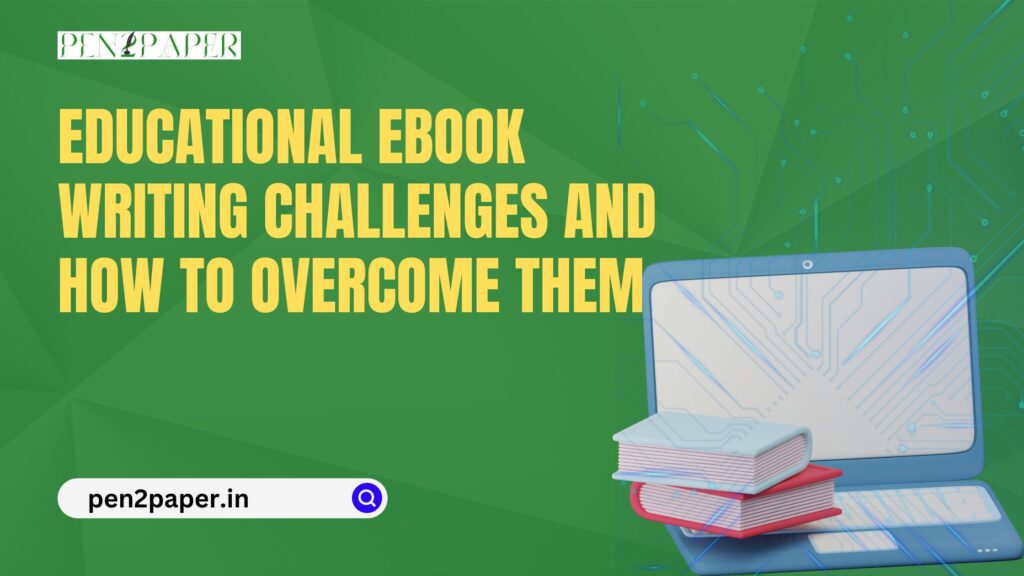Creating an educational eBook can be a rewarding yet challenging endeavor. Educational eBook writing requires not only subject matter expertise but also a flair for engaging storytelling and technical know-how. With eBooks gaining popularity as effective learning tools, authors and educators must navigate several hurdles to produce high-quality content. In this blog, we explore the common challenges of educational eBook writing and provide actionable solutions to overcome them.

What Makes Educational eBook Writing Unique?
Educational eBook writing stands out because it aims to inform, teach, or train a specific audience. Unlike general eBooks, these works must combine accuracy, clarity, and accessibility. Authors often face difficulties ensuring their eBooks are both engaging and pedagogically sound. Let’s delve into the challenges and how to address them.
Challenge 1: Finding the Right Tone and Style
The first hurdle in educational eBook writing is striking the perfect balance between a professional tone and an engaging style. Readers can quickly lose interest if the content is overly formal or too casual.
How to Overcome This:
- Understand Your Audience: Tailor the tone and complexity of your writing to suit the age, education level, and interests of your readers.
- Use Examples and Analogies: Simplify complex concepts with relatable examples.
- Test Your Content: Share draft sections with a sample audience and gather feedback.
Challenge 2: Structuring Content Effectively
A poorly organized eBook can confuse readers and undermine its educational value. Effective structuring is critical in educational eBook writing to ensure content flows logically.
How to Overcome This:
- Create a Detailed Outline: Plan chapters and subsections in advance.
- Use Clear Headings: Break down topics with descriptive headings and subheadings.
- Follow the Rule of Threes: Group concepts into threes for easier memorization and readability.
Challenge 3: Ensuring Content Accuracy
Educational material must be factually accurate and up-to-date. Errors can tarnish your credibility and mislead readers.
How to Overcome This:
- Research Thoroughly: Use reliable sources and verify information.
- Cite References: Provide citations for all data, studies, or quotes used.
- Collaborate with Experts: Consult with subject matter experts for technical accuracy.
Challenge 4: Engaging Diverse Learning Styles
Different readers have varied preferences and learning styles. Catering to auditory, visual, and kinesthetic learners in educational eBook writing is a complex task.
How to Overcome This:
- Incorporate Visuals: Use images, charts, and infographics to support text.
- Add Interactive Elements: Include quizzes, summaries, or hyperlinks for further exploration.
- Provide Examples: Real-world applications can help connect theory to practice.
Challenge 5: Keeping Readers Motivated
Even well-written eBooks can struggle to maintain reader interest over time. Boredom is a common issue in educational eBook writing.
How to Overcome This:
- Break Down Content: Use shorter chapters or bullet points to avoid overwhelming readers.
- Engage with Questions: Pose questions to encourage reflection and participation.
- Use Storytelling: Embed narratives or anecdotes to make learning relatable.
Challenge 6: Formatting for Digital Platforms
Formatting an eBook for digital devices can be a technical challenge. Ensuring compatibility with e-readers, tablets, and smartphones is vital in educational eBook writing.
How to Overcome This:
- Choose the Right Tools: Use software like Scrivener or Adobe InDesign for professional formatting.
- Test Across Devices: Preview your eBook on multiple platforms to check compatibility.
- Follow Best Practices: Use standard fonts, adequate spacing, and consistent headings.
Challenge 7: Promoting and Marketing the eBook
Even the best eBook won’t succeed without effective promotion. Marketing is an often-overlooked aspect of educational eBook writing.
How to Overcome This:
- Leverage Social Media: Share excerpts, visuals, and behind-the-scenes content.
- Offer Free Samples: Allow potential readers to preview the first chapter.
- Collaborate with Influencers: Partner with educators or industry leaders to spread the word.
Conclusion
Educational eBook writing presents unique challenges, from finding the right tone to ensuring technical compatibility. However, these hurdles are not insurmountable. By understanding your audience, structuring content effectively, and using the right tools, you can create engaging and impactful eBooks. Remember, the key to success lies in combining creativity with accuracy and accessibility.
Are you ready to tackle the challenges of educational eBook writing and produce a masterpiece that educates and inspires? Start today and turn your ideas into a valuable learning resource.
